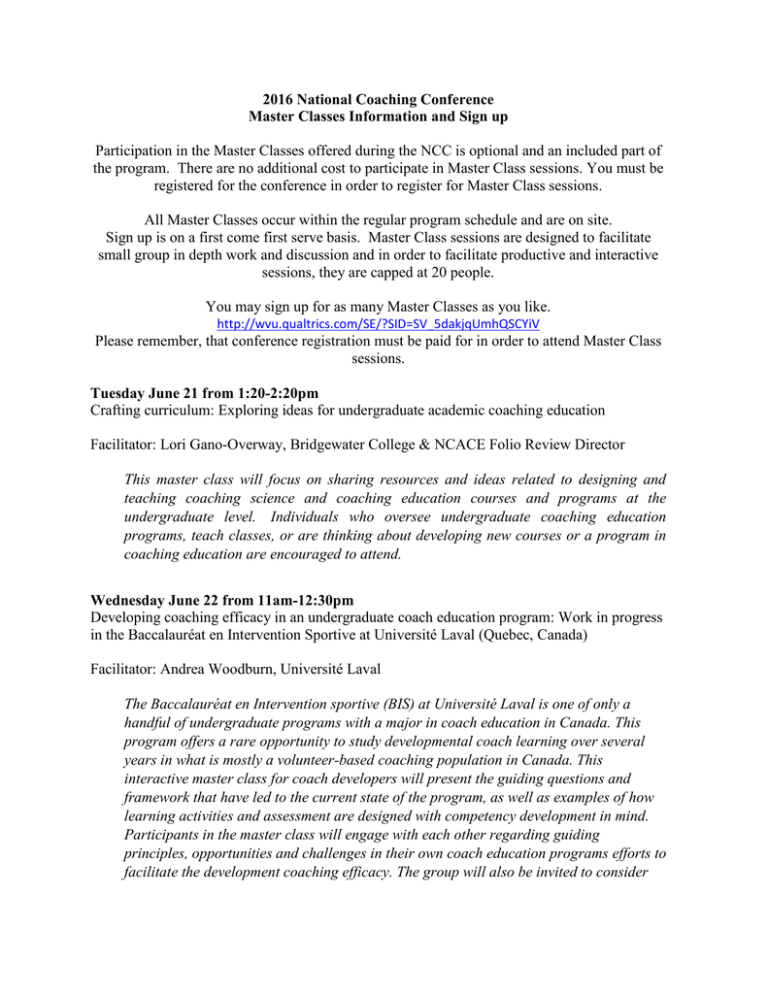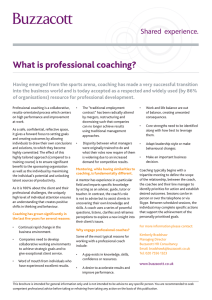Read more about the master class sessions
advertisement

2016 National Coaching Conference Master Classes Information and Sign up Participation in the Master Classes offered during the NCC is optional and an included part of the program. There are no additional cost to participate in Master Class sessions. You must be registered for the conference in order to register for Master Class sessions. All Master Classes occur within the regular program schedule and are on site. Sign up is on a first come first serve basis. Master Class sessions are designed to facilitate small group in depth work and discussion and in order to facilitate productive and interactive sessions, they are capped at 20 people. You may sign up for as many Master Classes as you like. http://wvu.qualtrics.com/SE/?SID=SV_5dakjqUmhQSCYiV Please remember, that conference registration must be paid for in order to attend Master Class sessions. Tuesday June 21 from 1:20-2:20pm Crafting curriculum: Exploring ideas for undergraduate academic coaching education Facilitator: Lori Gano-Overway, Bridgewater College & NCACE Folio Review Director This master class will focus on sharing resources and ideas related to designing and teaching coaching science and coaching education courses and programs at the undergraduate level. Individuals who oversee undergraduate coaching education programs, teach classes, or are thinking about developing new courses or a program in coaching education are encouraged to attend. Wednesday June 22 from 11am-12:30pm Developing coaching efficacy in an undergraduate coach education program: Work in progress in the Baccalauréat en Intervention Sportive at Université Laval (Quebec, Canada) Facilitator: Andrea Woodburn, Université Laval The Baccalauréat en Intervention sportive (BIS) at Université Laval is one of only a handful of undergraduate programs with a major in coach education in Canada. This program offers a rare opportunity to study developmental coach learning over several years in what is mostly a volunteer-based coaching population in Canada. This interactive master class for coach developers will present the guiding questions and framework that have led to the current state of the program, as well as examples of how learning activities and assessment are designed with competency development in mind. Participants in the master class will engage with each other regarding guiding principles, opportunities and challenges in their own coach education programs efforts to facilitate the development coaching efficacy. The group will also be invited to consider how research can be woven into the work that we all do such that it informs future practices for coach education in the university setting. Wednesday June 22 from 11am-12:30pm Beyond poetic philosophies and good intentions: A new coaching assessment framework Facilitators: Sara Lopez, Julie McCleery, & Hannah Olson, University of Washington This master class explores a novel framework linking five core coaching environments with specific athlete outcomes. You will experience identifying specific behaviors linked with an environment to assess coaching competency. Recognizing the complexity of coaching you will analyze characteristics of your own setting to identify factors influencing coaching expectations and potential gaps between theoretical understanding and actual coaching practices. Wednesday June 22 from 4-5:30pm Exploring learning theories: Activities for coach developers Facilitators: Melissa Thompson, University of Southern Mississippi, Sarah McQuade, e.t.c. Consultants, and Nadine Dubina, West Virginia University As highlighted in the International Coach Developer Framework, coach development systems are only as effective as the coach developers delivering the content. Creating and maintaining an active, engaging learning environment is one of the biggest challenges facing coach developers. While previous literature has established a relationship between coach training and coaching efficacy (Malete & Feltz, 2000), athlete satisfaction (Barnett, Smoll, & Smith, 2010), and athlete social development (Conroy & Coatsworth, 2006), effectively engaging coaches in that training is extremely difficult. Having a better understanding of adult learning theories can help coach developers deliver more engaging training sessions. Further, helping coaches understand their own learning styles can facilitate coach learning beyond the workshop setting. Therefore, the purpose of this workshop is to review three prominent adult learning theories; Transformative Learning Theory (Mezirow, 1997), Self-Directed Learning Theory (Garrison, 1997), and Experiential Learning Theory (Kolb, 1976). Elements of each of the theories will be discussed followed by example activities and strategies to implement these theories in coach development settings. A combination of direct (explained to the participants) and indirect (embedded in the environment) uses of the theories will be explored. Finally, participants will have an opportunity to discuss with other coach developers how they use the concepts in coach training. Thursday June 23 from 8-9:30am Evaluating and enhancing your organization’s readiness to provide quality coaching education Facilitators: Christine Bolger, USOC Coaching Education & Kristen Dieffenbach, West Virginia University Center for Applied Coaching and Sport Science This master class is designed for individuals and departments within National Governing Bodies and other sport organizations that are tasked with developing and leading coaching education and coach development within their sport. The facilitators will share current best practices and models related to coaching education and coach development as well as explore the structure needed to create and build meaningful programs. This Master Class will also facilitate networking and sharing of resources and ideas among participants.



